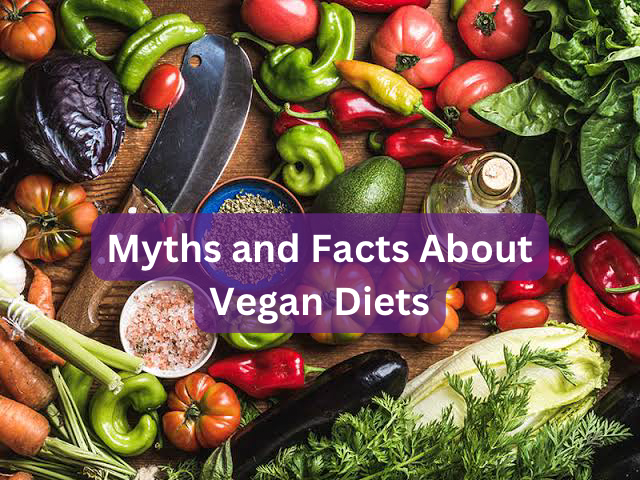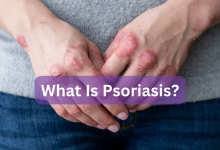Myths and Facts About Vegan Diets

The popularity of vegan diets has soared in recent years, driven by concerns about health, the environment, and animal welfare. However, misconceptions and myths surrounding veganism have also proliferated. In this blog post, we will debunk these common myths and shed light on the facts, providing a comprehensive understanding of vegan diets.
Myth 1: Vegans Don’t Get Enough Protein
Fact: Protein requirements can be easily met on a plant-based diet through foods like legumes, tofu, tempeh, seitan, and quinoa. Numerous vegan athletes and bodybuilders have demonstrated that plant-based diets can provide ample protein for strength and muscle development.
Myth 2: Vegan Diets Lack Essential Nutrients
Fact: A well-planned vegan diet can supply all necessary nutrients. Sources like plant-based milks, cereals, and supplements provide vitamin B12, while flaxseeds, chia seeds, and walnuts offer omega-3 fatty acids. Iron can be obtained from lentils, spinach, and fortified grains. With proper meal planning, vegans can easily obtain all the nutrients their bodies need.
Myth 3: Vegan Diets Are More Expensive
Fact: While vegan specialty products can be costly, staples like fruits, vegetables, grains, legumes, and nuts are often cheaper than animal-based products. Seasonal and locally sourced produce can help reduce costs further. Planning meals in advance, buying in bulk, and cooking at home are effective ways to save money on a vegan diet.
Myth 4: Vegan Diets Lack Flavor And Variety
Fact: Vegan cuisine offers a vast array of flavors and textures. Exploring plant-based cooking introduces individuals to new ingredients, spices, and cooking techniques that can transform ordinary dishes into extraordinary ones. With the abundance of vegan-friendly products and recipes available online, the options for delicious vegan meals are practically endless.
Myth 5: Vegan Diets Are Not Suitable For Children Or Pregnant Women
Fact: When properly planned, plant-based can be suitable for people of all ages. Ensuring adequate intake of specific nutrients like vitamin B12, iron, and calcium is crucial during these life stages. Consulting with a healthcare professional or registered dietitian can provide valuable guidance in ensuring a balanced vegan diet for these populations.
Myth 6: Vegan Diets Lack Calcium For Strong Bones
Fact: Plant-based sources such as kale, broccoli, almonds, tofu, and fortified plant-based milk provide ample calcium. Vegans can maintain strong and healthy bones by incorporating these foods into their diet.
Myth 7: Vegan Diets Are Restrictive And Difficult To Follow
Fact: With numerous resources, cookbooks, and online communities available, transitioning to a vegan diet does not have to be restrictive or challenging. It can be as simple or complex as desired, allowing individuals to choose from a wide range of delicious and nutritious plant-based foods.
Myth 8: Vegan Diets Lack Energy And May Lead To Fatigue
Fact: Properly planned vegan diets can provide abundant energy. Whole grains, legumes, fruits, and vegetables are excellent sources of complex carbohydrates that release energy slowly. The high fiber content in plant-based diets helps maintain steady blood sugar levels and prevent energy crashes.
Myth 9: Vegan Diets Are Not Sustainable For The Environment
Fact: Such diets have a significantly lower environmental impact compared to diets rich in animal products. Choosing plant-based alternatives reduces greenhouse gas emissions, deforestation, water pollution, and species extinction, contributing to a more sustainable future.
Myth 10: Vegan Diets Automatically Lead To Weight Loss
Fact: Weight loss or gain on a vegan diet depends on various factors such as calorie intake, food choices, portion sizes, and physical activity levels. It can be tailored to support weight loss or maintenance, but it’s important to focus on a balanced diet and overall healthy lifestyle.
By dispelling these myths and highlighting the facts about vegan diets, we provide a clearer understanding of this lifestyle choice. It can be nutritionally adequate, affordable, flavorful, and suitable for people of all ages. They also offer numerous environmental benefits. With proper planning and knowledge, a vegan diet can provide all the necessary nutrients for a healthy and fulfilling life. Whether you’re considering veganism or simply curious, embrace the benefits of a plant-based lifestyle and make informed decisions about your dietary choices.







